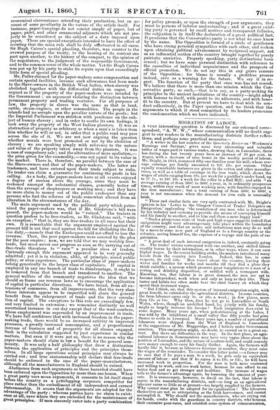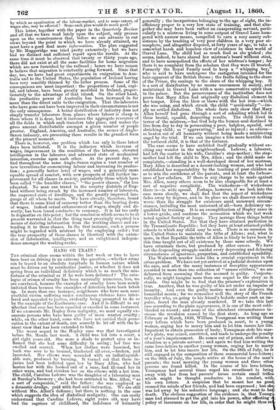MIGRATION OF LABOUR.
A VERY interesting question is discussed by our esteemed corre- spondent, "A. W. W.," whose communication will no doubt sug- gest to our readers in the manufacturing districts further reflec- tions, and perhaps some practical measures- " A writer in the last number of the Quarterly Revive on 'Workmen's Earnings and Savings,' gives some very interesting and valuable tables of wages paid in various trades, showing that, in Lancashire, there has during the last twenty years been an increase of 20 per cent. in wages, with a decrease of nine hours in the weekly period of labour. Mr. Bright, in 1844, instanced fifty-one families near his mill, whose ave- rage earnings per family amounted to 921. 19s. per annum. Other equally remarkable instances are given in the cotton and other manufac- tures, as well as a table of earnings in the iron trade, which shows the wages of adults ranging from 19.s. per week for a puddler's under hand, up to 71. 7s., to 101. 10s. a week for the roller in a Rail Mill ; and adds "an average earning of from 2001. to 3001. a year, is, in ordinarily prosperous times, within easy reach of most working men, with families engaged in the iron manufacture ; but a total earning of from 500/. to 6001. a year is not uncommon when the demand for iron rails is unusually brisk.
" These and similar facts are very aptly contrasted with Mr. Bright's opinion in his ' Letter to the Glasgow Council of Trades' Delegates on Emigration,' applauding 'the resolution of any man who is determined by his industry and economy to provide the means of conveying himself and his family to another, and to him and them a more happy land.' " Such a prosperous state of trade and high wages suggests indeed that emigration might very advantageously take place within the boundaries of the country, and that an active and industrious man may do as well by a move to some new part of England as to a foreign country or the colonies, saving himself too, the expense of a voyage and the pain of ex- patriation.
" A great deal of such internal emigration is, indeed, constantly going on. The trades' unions correspond with one another, and skilled labour readily learns by their information, or in other ways, where it can earn higher wages. In the recent building strike, the masters introduced many hands from the country into London. Indeed, this has, in some
respects, its evil side. Men travel about the country, leaving their wives and families for weeks and months till they find a place they think suitable; a system which presents great temptations to a man of a roving and drinking disposition, or saddled with a termagant wife. Knowing, too, that labour is in great demand, the men are apt to become independent, work when and only as long as they like. Their tastes and habits too often make beer the chief luxury on which they spend their increased wages.
" But I think, sir, that this system of internalemigration might, with great benefit, be extended to the agricultural districts., In some counties, the farm labourer earns only Os. or lOs. a week ; in few places, more than 128. or 14s. Why then, does he not go to Lancashire or South Wales, where, though an unskilled hand, he, jointly with his family, might so largely increase his income ? Such emigration does exist to some degree. Many years ago, when pedestrianising at the Lakes, I was told by the inhabitant of a small valley that fifty youths had gone thence to settle in Liverpool. Many years ago, a number of agricultural labourers were shipped from the West of England to Lancashire at the suggestions of Mr. Muggeridge, and I believe under Government sanction. This emigration might, no doubt, be carried on to a great ex- tent. But there are difficulties in the way. In the first place, an agri- cultural labourer in Somersetshire may have very vague ideas about the position of Lancashire, and the nature of a cotton-mill, and could scarcely save money enough to carry his family thither. Again, the farmers will hardly like it, because as labourers decrease in number, they must raise the wages of the remainder. To consider this latter point :—a farmer may be sure that if he pays a man 8s a week, he gets only an equivalent amount of labour and that if he raises it to lOs. or 12s., he will have increased work in proportion. For the man is both more contented and willing to work, and can work better, because he can afford to eat better food and so get stronger and healthier. The increase of wages tells to the farmer's advantage again, by lessening the amount of poor- rate. It is unnecessary, however, to dwell on the fact, that labour is scarce in the manufacturing districts, and—so long as an agricultural labourer earns so little as at present—too largely supplied to the farmers. Why cannot some plan be adopted for its equalization The labourers themselves are not so enterprising as the Irish harvestmen, and cannot accomplish it. Why should not the manufacturers, who are crying out for hands, confer with the guardians in country districts, who bemoan their excessive poor-rates, and establish some system of communication,
by which an equalization of the labour-market, and to some extent, of wages also, may be effected ? Some such plan would do much good."
This letter, together with the paper in the Quarterly Review and all that we have read lately upon the subject, only presses upon us the consciousness that, before we can advance in our views beyond the point to which we have already attained, we must have a good deal more information. The plan suggested by Mr. Muggeridge was tried pretty extensively ; but we have had no distinct and sufficient report upon the results. At the same time it must be observed that twenty or thirty years ago, there did not exist at all the same facilities for home migration which are now furnished by the railroad ; hence we have reason to believe that migration is constantly going forward. Since that day, too, we have had great experiments in emigration to Aus- tralia and to the United States, the population of Ireland having been very sensibly thinned by the latter process. Some of the consequences are most important : the proportions of land, capi- tal, and labour, have been greatly modified in Ireland, propor- tionately to the advantage of that island. On the other hand, the productive power of Australia has been increased in far more than the direct ratio to the emigration. That the labourers who have gone out have been improved in their circumstances is not the only consequence. A better distribution of industry does not simply transfer labourers from places where labour is cheap to those where it is dear, but it increases the aggregate resources of all the fields in which such transfers take place, and makes the gross amount distributable amongst a given number of people greater. England, America, and Australia, the scenes of Anglo- Saxon industry, are presenting these results in the grandest form at the present moment.
There is, however, one problem which has only in these latest days been initiated. It is the influence which increase of wages, improvement in the condition of the labourer, elevated intelligence in the labourer, and advanced state of mechanical invention,-exercise upon each other. At the present day, we find throughout the same Anglo-Saxon region a vast number of new inventions for economizing labour and increasing its produc- tion ; a generally better level of wages, and a generally more equable spread of comfort, with new prospects of still further im- provement for all classes in society, particularly those which have been called "the humbler classes," "the poorer classes," the less educated. No man can travel in the country districts of Eng- land without being struck by the increased number of labourers, the improved state of dwellings, and the greatly improved lan- guage of all whom he meets. We have already, therefore, found that there is some kind of economy better than the beating down of wages. Indeed actual enhancement of wages, simply and di- rectly, has been found conducive to economy. It is far too early to dogmatize on this point ; but the conclusion which seems to be at present warranted is, that the thing most pressingly required is a means of deriving information from the working classes and ex- tending it to those classes. In the first instance, such a process might be regarded with mistrust by the employing order; but the true prosperity of those classes is identical with the exten- sion of information, intelligence, and an enlightened indepen- dence amongst the working ranks.



























 Previous page
Previous page